What is your first thought when you see a Samoyed dog? Are you drawn to their ever-present grin and their kind expression? Perhaps you notice the luxuriousness of their beautiful white fur.
Certainly, your first thought wouldn’t be, “I wonder if this fluffball Samoyed is hypoallergenic?” In fact, if you are allergic to dogs, you probably will already be backing away horrified by the sheer amount of dog hair that is before you!
But, if you are an allergy sufferer who dreams of befriending a fluffy white dog, read on! Because you just might have found the solution.
Are Samoyeds Hypoallergenic?
Surprisingly, yes! Most of the time, the idea of hypoallergenic dogs is associated with smaller dogs who have either tight curly or silky straight hair. The Samoyed, a medium to large puffball of fluffy white hair, doesn’t fit that idea so well.
Despite all the fluff, Samoyeds have very low dander levels which is a big source of allergens — but not the only source. The proteins that irritate allergy sufferers are found in dog saliva, urine, dander, and hair.
Since most people teach their dogs to urinate outdoors, it’s the other three that tend to be the issue. As mentioned, Samoyeds have low dander levels and the proteins they do shed are less irritating to allergy-prone people.
As far as saliva, the Samoyed doesn’t drool much at all. The corners of a Samoyed's mouth are turned upward, reducing the drooling and giving them their characteristic “Sammy Smile”.
Aside from the adorable, friendly appearance it gives them, there’s a very good reason for this. Excessive drool dripping from their lips would turn into icicles on the frigid plains of Siberia where these dogs originated. Imagine how uncomfortable that would be!
So that only leaves hair as a major source of allergens, which the Samoyed has in abundance. However, like the dander, the proteins found in the Samoyed's hair tend to be less irritating than those found in other dogs.
Thus, the Samoyed is considered a hypoallergenic dog, in spite of all that fluff!

Samoyed Quick Facts
- Medium to large size dog
- A friendly dog that is great for families
- High energy level
- Intelligent and generally easy to train, but needs a firm hand
- Doesn’t like to be left alone
- Doesn’t do well in small spaces
- Doesn’t do well in hot climates
What Is a Samoyed?
The Samoyed is a fluffy white dog that was bred for work in Siberia. As such, they were bred to withstand the frigid temperatures of the region and have seemingly boundless energy to perform the tasks at hand.
Their main purpose was to pull sleds across the Siberian plain. Specifically, they come from Oymyakon, a town where temperatures down to -60 degrees Fahrenheit are commonplace.
A well-trained Samoyed is affectionate and friendly and makes a wonderful family dog. Though try to confine a Samoyed and you’ll quickly discover a force to be reckoned with!
They are social and energetic and thus don’t do well when left alone in a small space. They quickly become bored and destructive as their mischievous streak gets them into trouble.
Curious about this gorgeous dog with such glorious hair? Keep reading to learn more!
The Samoyed Physical Characteristics and Coat
Most Samoyeds grow to between 19 and 23 inches at the shoulder and weigh between 35 and 65 pounds. This earns the Samoyed status as a medium to large size dog depending on the individual’s characteristics.
His double-layer coat consists of a super thick, wooly undercoat and a longer overcoat of guard hairs. This construction protects the pup in temperatures dropping as low as -60 degrees Fahrenheit!
Most Samoyeds are white, though not all of them are pure white. Many Samoyeds have cream or biscuit coloring. Though, honestly, most people would still consider them white even if their hair is not technically pure white.
The Samoyed's dark eyes stand out in contrast to its light-colored fur. Its triangular ears give the dog a foxlike look and contribute to its intelligent appearance.
But the most endearing thing about the Samoyed’s appearance is its smile. This happy-go-lucky dog seems to have a permanent smile on its face but does it have a joyful, affectionate attitude to match?
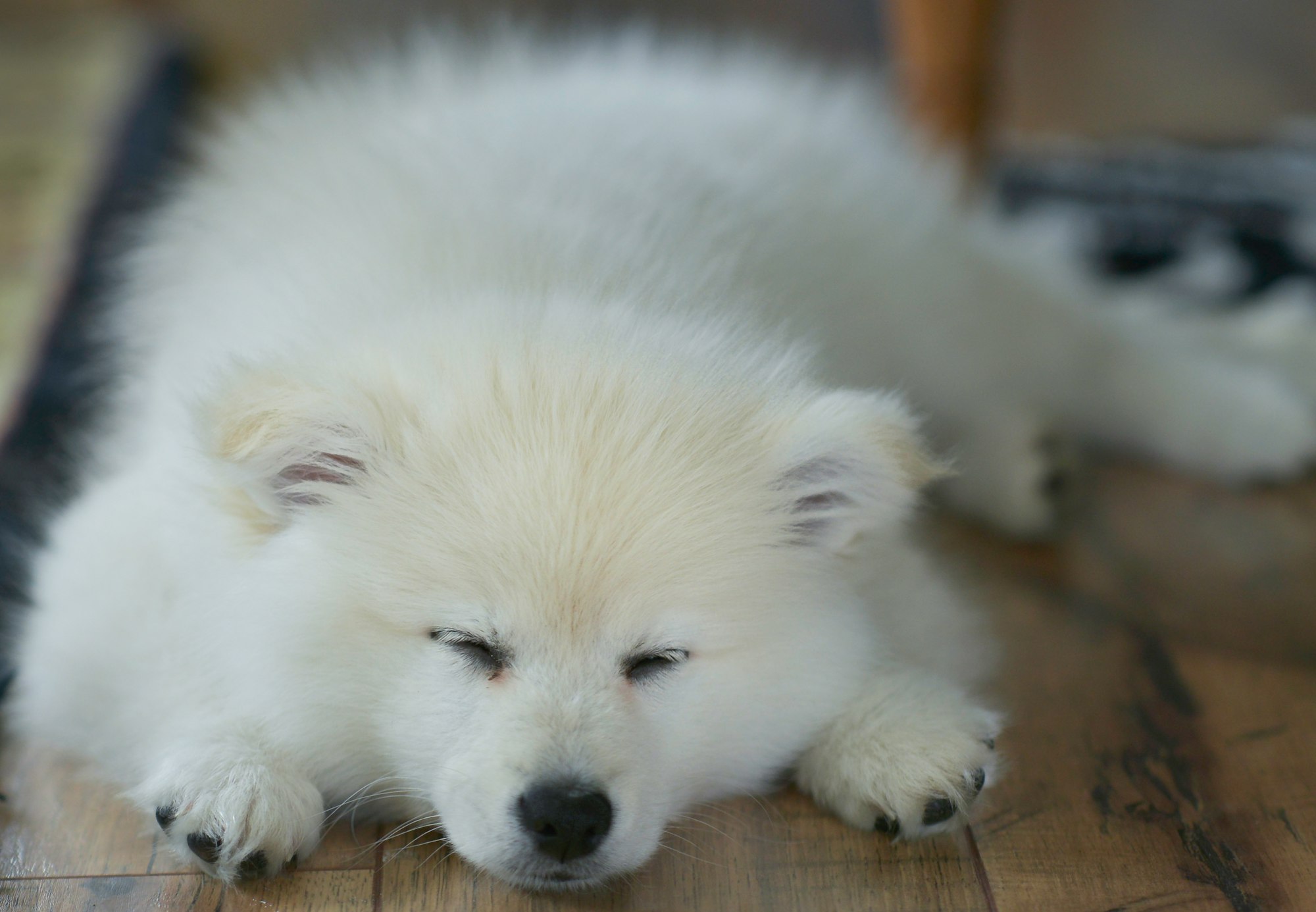
Samoyed Temperament
The Samoyed is a highly loving and affectionate dog. They are very sociable and loyal, love people, and are gentle and patient with small children. They make wonderful family dogs and are fabulous when part of a busy household.
Because of their sociability, Samoyeds get lonely and anxious when left home alone for long periods of time. They definitely are not adequate for a single person or couple who work outside the home. But give them a passel of kids to play with and they’ll be in seventh heaven!
They do tend to bark and will alert you to intruders, but their friendly personality does not make them good as guard dogs. They’d much rather welcome guests into your home than take a chunk out of them!
Samoyed Training and Exercise
Consistent with their intelligent appearance, Samoyeds are very smart dogs but can be stubborn at times. They require a firm hand in training and you shouldn’t expect total cooperation at all times.
Thus, it is important to start training with a Samoyed as young as possible. Older Samoyeds are more set in their ways and will be even more stubborn.
If you can ensure that your Samoyed regards you as the “alpha dog” you’ll find that training is much easier. So be firm, though kind and consistent, with your Samoyed. These dogs do well with positive reinforcement.
Since they were originally bred as working dogs, Samoyeds have a lot of energy. And they must burn this energy and receive plenty of both mental and physical stimulation. If they don’t, they quickly devolve into a destructive force like none you’ve ever known!
Thus, a home with a large yard and plenty of space for the Samoyed to run is preferred. Because of their friendliness, Samoyeds are accepted into apartment complexes and can technically live there. But you must be diligent about taking them out for a walk every day or they will destroy your apartment.
At a minimum, Samoyeds need at least one hour of vigorous exercise during the day. This can be given in a walk or with toys like flirt poles. Also, make sure that your Samoyed has abundant chew toys and puzzle toys designed to provide mental stimulation at his disposal.

Samoyed Grooming and Care
With all that hair, prepare to spend lots of time brushing your Samoyed. Be sure to introduce your Samoyed to brushing as early as possible. This will help make it a pleasant experience for you both. In fact, brushing your Samoyed is great for bonding with your pup.
To keep your furniture relatively free from dog hair, you’ll need to brush your pup a couple of times a week. During the two seasonal blowouts, you’ll have to step this up to every day if you want any hope of seeing your furniture under all the dog hair.
A regular brush works fine, but one with a vacuum hose attached will make the job quicker and more effective.
Bathing a Samoyed is quite an experience. But if they get very dirty or muddy, a bath is a must. Groomers charge extra for bathing a Samoyed but may also use special tools to clear away some of the excess hair.
If you bathe your Samoyed yourself, have extra towels on hand because you will definitely need more than one to dry him. And it can be a good idea to get your Samoyed used to a blow dryer as a pup to make the drying process a little easier.
Do Samoyeds Shed a Lot?
Umm…yes, Samoyeds shed considerably. Have you seen a Samoyed? They’re so fluffy and furry that when you brush them you can create another whole dog out of what you brushed off them!
Or, interestingly enough, you could gather up the hair, wash it, spin it into yarn, and make yourself a warm winter hat out of your dog's fur. That way, when you go on winter outings, you’ll match perfectly!
This is a big reason that the hypoallergenic status of this dog is surprising. Most people associate hypoallergenic dogs with low-shed dogs like Poodles that won’t leave dog hair all over your furniture.
The Samoyed absolutely will leave white dog hair all over your house, though you can reduce the amount with regular brushing.
They experience two big blowouts a year when they shed their undercoat. During this time, you’ll have to step up the brushing sessions if you want any hope of keeping your home relatively free of dog hair.
They still shed the rest of the year, though a little less heavily.
Are Samoyeds Good with Kids?
Absolutely! These friendly and affectionate dogs, though on the large side, are very gentle and patient. They have boundless energy, just like your little ones, and make great companions for one another.
A well-trained Samoyed and kids have so much fun together. As a bonus, they help to wear each other out as they play throughout the day!
Are Samoyeds Outdoor Dogs?
Because of their excessive energy, Samoyeds like to be outdoors and it’s great to have a place for them to run. However, you shouldn’t leave them outdoors by themselves for long periods of time.
They are super smart and cunning escape artists. Once they get bored, they will start looking for ways to get out of their confinement. And since they get bored easily, it doesn’t take too long!
Not surprisingly, Samoyeds can overheat easily and they always need a place where they can keep cool in hot weather. Additionally, plenty of clean water should always be available for them to drink.
And of course, Samoyeds are hard to bathe once they get dirty. Your Samoyed will stay cleaner if they spend more of their time indoors.
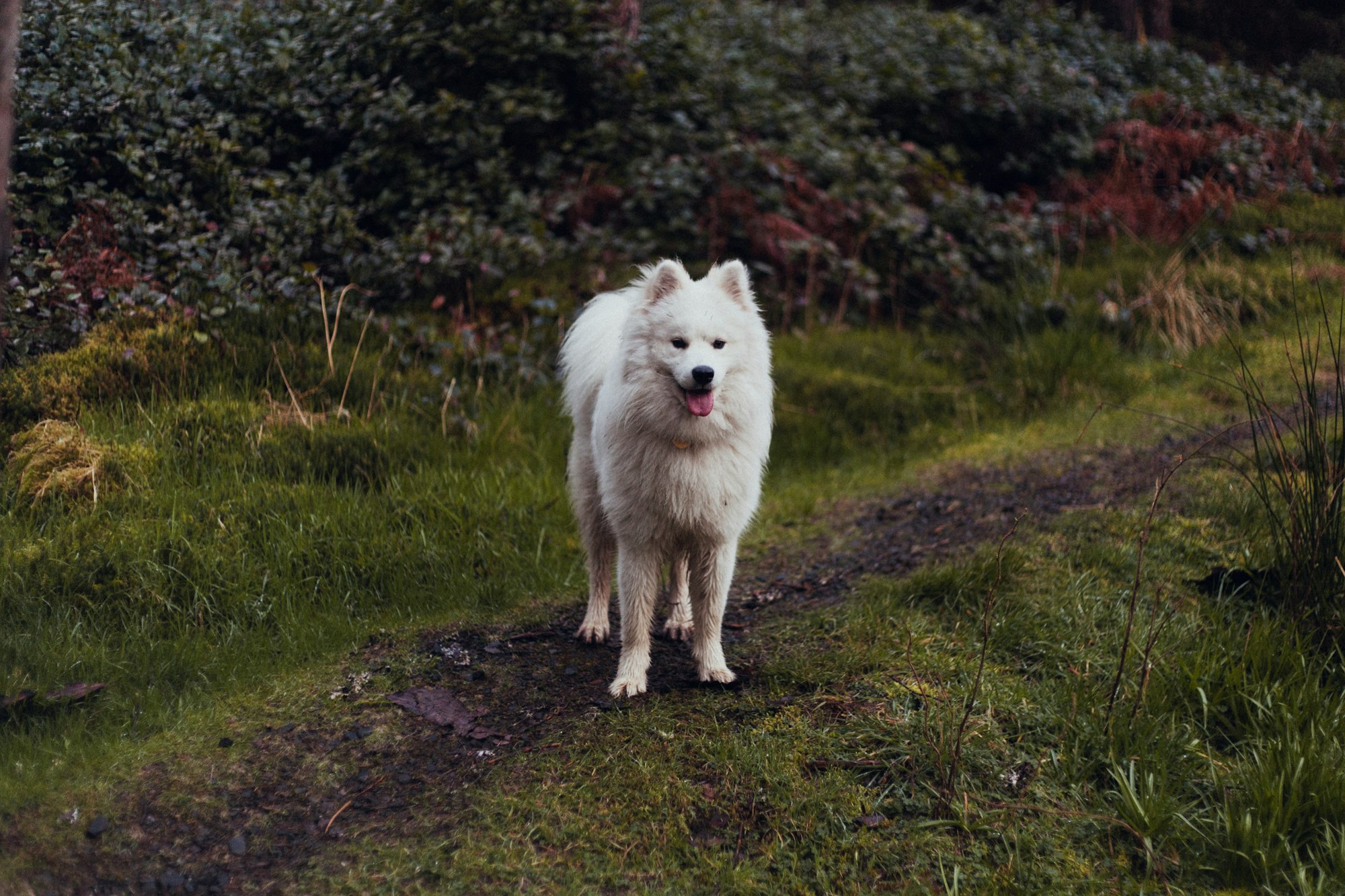
Similar Dog Breeds to Samoyed
Samoyeds aren’t the only fluffy white dog out there. The American Eskimo Dog is sometimes confused with the Samoyed to the untrained eye. However, “Eskies” were bred for herding, not pulling sleds, and don’t have the thick undercoat of the Samoyed.
Additionally, white Chow Chows, the Great Pyrenees, the Maremma Sheepdog, the Hokkaido Dog, and the Slovensky Cuvac all share the Samoyed’s similarity in appearance to a polar bear. Interested in more fluffy dogs? Check out our list of big fluffy dogs!
Want to know more about the Samoyed?
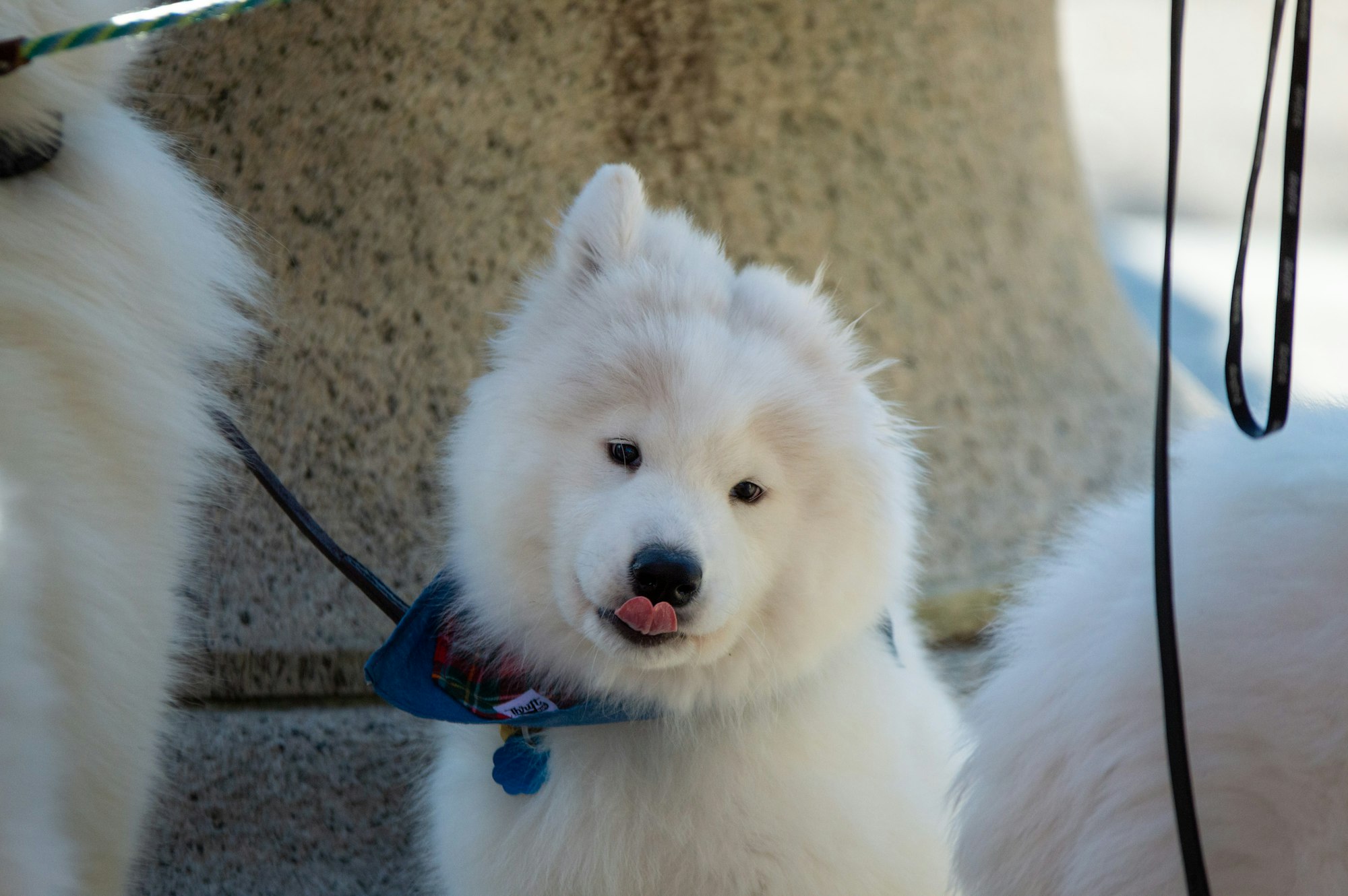
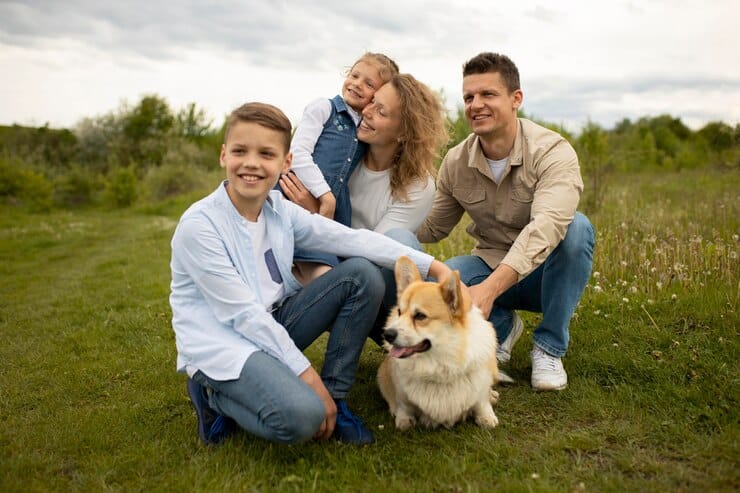
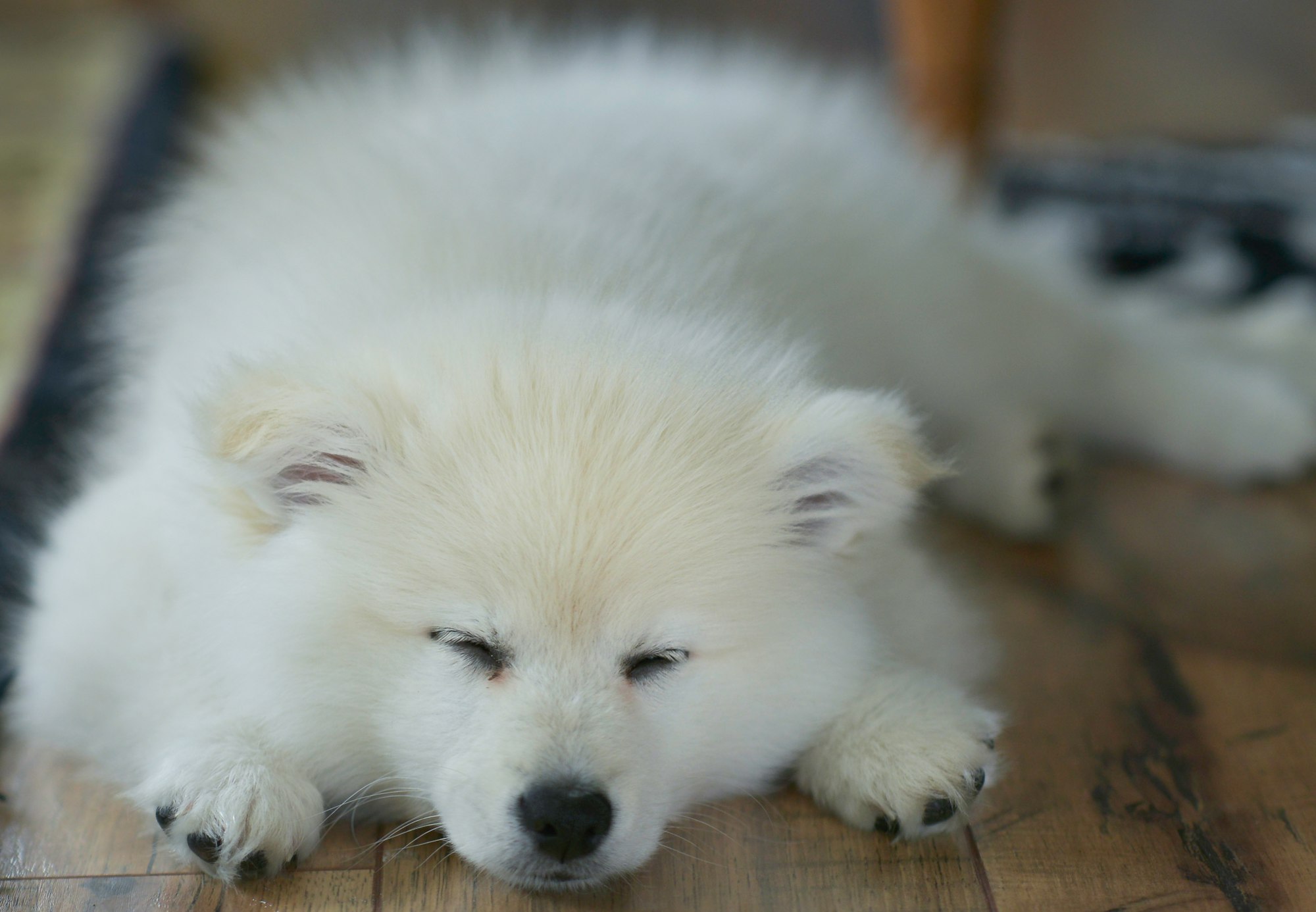
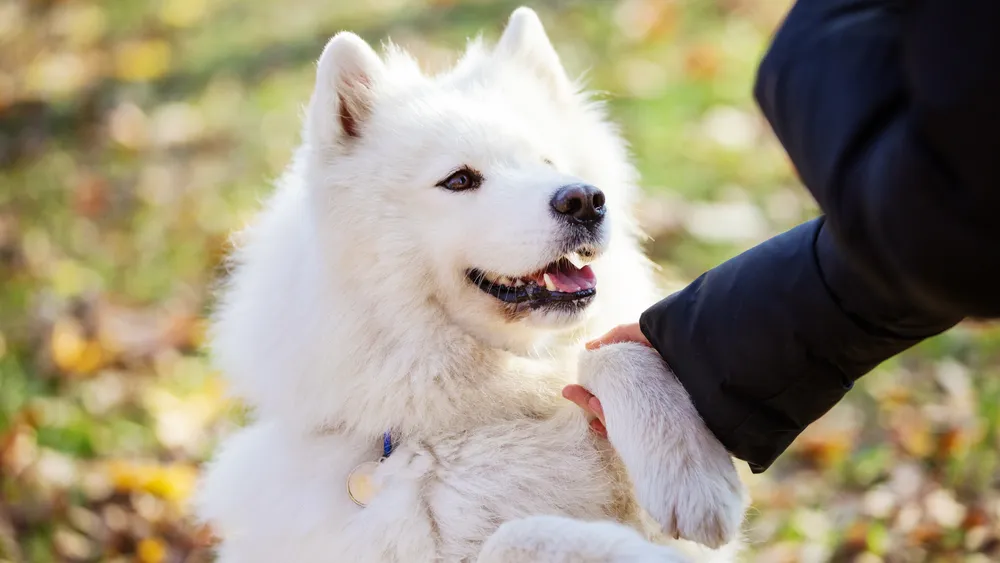
For more helpful articles about pet-parenting tips, check out the Off Leash blog at TryFi.com.
Want to know more about TryFi.com? The Fi Dog Collar is a GPS tracking collar that not only keeps track of your dog’s location, activity levels, and sleep patterns, but it also alerts you if your dog escapes your backyard. This is the fastest way to find your dog after an escape. Try the Fi Dog Collar today!


